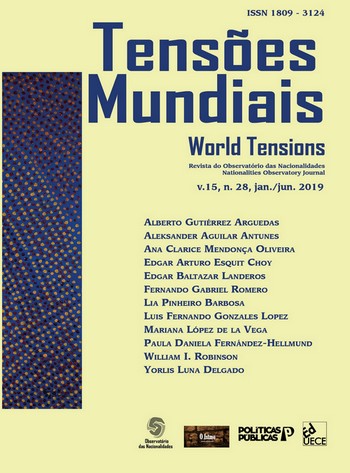La Segunda Implosión de Centroamérica
DOI:
https://doi.org/10.33956/tensoesmundiais.v15i28.1120Resumo
Décadas después de la finalización de las las guerras de revolución y contrainsurgencia en Centroamerica, la región otra vez esta al borde de una implosión. El Istmo ha estado sumido en una reanudación de las luchas de masas y la represión estatal, el desmoronamiento de los frágiles sistemas políticos, la corrupción sin precedente, la violencia del narcotráfico, y el despojo y migración forzada de millones de obreros y campesinos. El telón de fondo de esta segunda implosión de Centroamérica – reflejando la crisis galopante del capitalismo global – es el agotamiento de una nueva ronda del desarrollo capitalista que se produjo a raíz de las convulsiones de los 1980 al ritmo de la globalización. El modelo transnacional de acumulación abarcó la introducción de nuevas actividades económicas que integraron la región a las cadenas transnacionales de producción y servicios, parte misma de la globalización capitalista que ha involucrado una vasta expansión de las operaciones de la minería, la agroindustria, el turismo, la extracción energética, y los mega-proyectos de infraestructura a lo largo de América Latina, alimentando una economía global voraz y desbordando las arcas de las corporaciones transnacionales. Pero la reanudación del crecimiento desde los 1990 ha dependido de tres factores que ahora están alcanzando sus limites: un fuerte incremento del flujo de la inversión corporativa transnacional, el aumento constante de la deuda externa, y las remesas enviadas por los Centroamericanos que viven en el exterior. La globalización y el neoliberalismo han hecho estragos a las clases trabajadoras y populares, dejándoles escasamente preparados para sobrevivir el la recesión económica venidera y el estancamiento local.
Downloads
Publicado
Como Citar
Edição
Seção
Licença
Autores mantêm os direitos autorais e concedem à revista o direito de primeira publicação, com o trabalho simultaneamente licenciado sob a licença Creative Commons Atribuição 4.0 Internacional que permite o compartilhamento do trabalho com reconhecimento da autoria e publicação inicial nesta revista.






